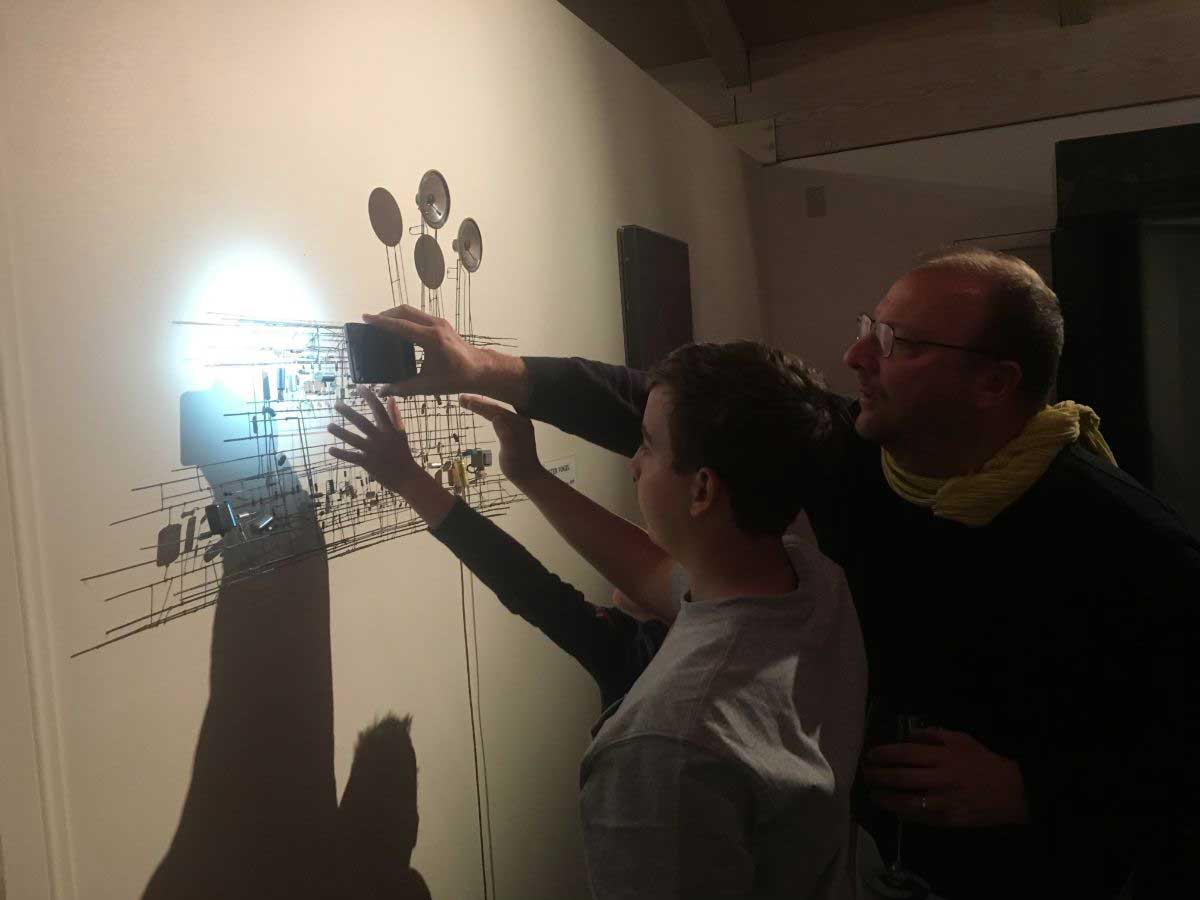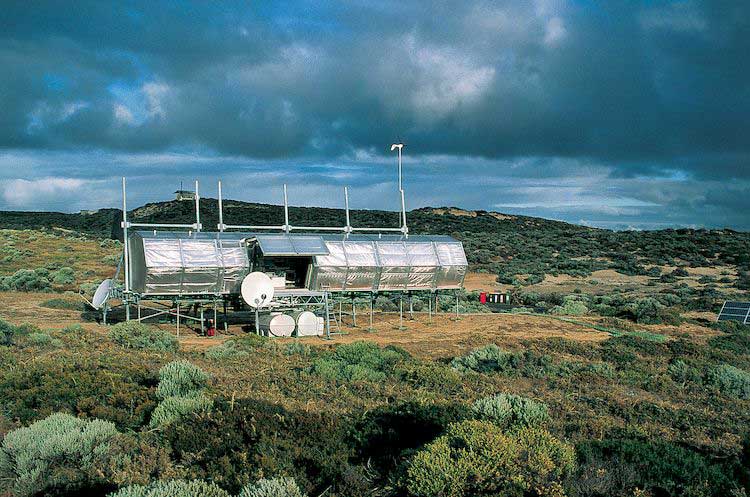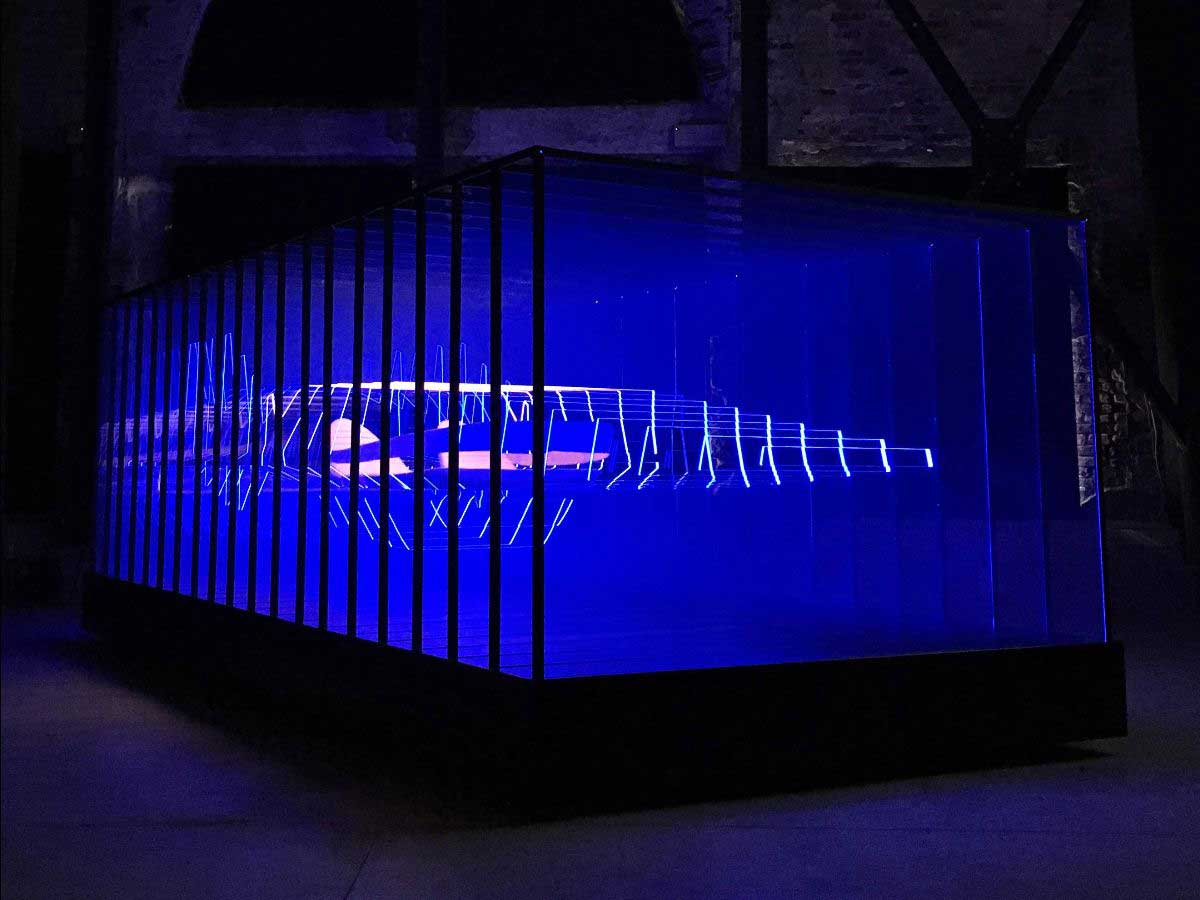In the Belly of the Beast – Southern California Art, Technology, Science and Society Nexus – A Historical Landscape
MARKO PELJHAN is a distinguished artist, researcher, and professor whose work spans the fields of art, technology, and science. Born in 1969 in Slovenia, he has significantly contributed to new media art through his innovative projects and research. Peljhan co-founded the arts and technology organization Projekt Atol in 1992 and played a crucial role in establishing the Ljubljana-based new-media laboratory Ljudmila a year later.
One of his most notable projects is Makrolab, an autonomous communications and research laboratory focused on weather, climate, telecommunications and migrations research, First presented at Documenta X in Kassel in 1997. Makrolab has since operated in various locations around the world, including Western Australia, Venetian Lagoon and the Scottish Highlands. Peljhan’s work often addresses themes of surveillance, geopolitics, and environmental issues. Among others he co-founded the Interpolar Transnational Art Science Constellation in 2002 and in 2008 with fellow artist and colleague Matthew Biederman the Arctic Perspective Initiative. He is the recipient of many prizes for his work, including the 2001 Golden Nica Prize at Ars Electronica with Carsten Nicolai and his work has been exhibited internationally at multiple biennales (Venice, Lyon, Istanbul, Gwangju, Johannesburg, Moscow…) exhibitions and festivals, such as documenta, ISEA, Ars Electronica and museums and art institutions worldwide YCAM, ICC-NT, PS.1. MOMA, GARAGE…). In 2019 he was the representative of the Republic of Slovenia at the Venice Biennale with the work “Here we go again…SYSTEM-317”.
Since 2002, Peljhan also serves as professor and director of the Systemics Lab located in the California Nano Systems Institute at UCSB, he was co-director of the UC Wide Institute for Research in the Arts from 2008-2014 and from 2017-2022 he served as Chair of the Media Arts and Technology Graduate Program at the University of California Santa Barbara. He also served as the coordinator of international cooperation for SPACE-SI Slovenian Centre for Space Sciences and Technologies and helped to conceive and launch the first Slovenian remote sensing satellite, NEMO-HD in 2020. He is also editor at large of the music label rx:tx and is known to operate in the radio spectrum as S54MX.
Responders
DARKO FRITZ (b. 1966) is a visual artist and freelance curator. He has presented his work at more than thirty solo and over a hundred group exhibitions worldwide, and was also active in the artistic groups The Imitation of Life Studio (with Željko Serdarević, 1987–1990) and Cathedral (Katedrala, 1988). He critically observes the society- changing technology, while his work bridges the gap between contemporary art, media art and network culture, thereby taking over topics such as glitch and monitoring. In 2006, he initiated the association siva) (zona [grey) (area], as part of which he has curated more than 50 exhibitions. The list of over a hundred exhibitions he has hitherto curated includes I am Still Alive (digital art of the 1960s and the 1970s, and the recent lotech and internet art), Zagreb, 2000; CLUB.NL — Contemporary Art and Art Networks from the Netherlands, Dubrovnik, 2000; bit international — [New] Tendencies — Computers and Visual Research, 1961–1973, Neue Galerie, Graz, 2007, and ZKM, Karlsruhe, 2008–2009; Angles and Intersections (co-curated with Nina Czegledy, Elena Rossi and Peter Dobrila, art director: Christiane Paul), MMSU, Rijeka, 2009; and Histories of Post-Digital, Akbank Sanat, Istanbul, 2014. He authored the book Digital Art in Croatia (1968 –1984), Technical Museum Nikola Tesla, Zagreb, 2021, and the eponymous exhibition in 2022, as well as the thematic segment Media Art for culturenet.hr, 2002. He co-edited (with M. Gattin, M. Rosen, and P. Weibel) the book A Little-Known Story About a Movement, a Magazine, and the Computer’s Arrival in Art: New Tendencies and Bit International, 1961–1973, ZKM, Karlsruhe / MIT Press, Cambridge, Mass., 2011. He is a member of the professional organisations AICA, HDLU and HZSU, and an honorary member of ULUPUH.
Read more
ANDREAS BROECKMANN is an art historian and curator who lives in Berlin. He is engaged in the DFG-funded research and documentation project Les Immateriaux Research at Leuphana University Lüneburg (2021-2024). He teaches at the Academy of Fine Arts, Leipzig (HGB – Hochschule für Grafik und Buchkunst) where he holds an Honorary Professorship, and was Visiting Professor for Art History and Media Theory (2017-2020). Visiting Professor for Art and Media Studies at Oldenburg University (2016-2017). He was the Artistic Director of the Leuphana Arts Program (2011-2016), the founding director of Dortmunder U – Centre for Art and Creativity (2009-2011), and has curated exhibitions and festivals in major European venues, incl. transmediale and ISEA2010 RUHR. He holds a PhD in Art History from the University of East Anglia, Norwich/UK, and lectures internationally about the history of modern and contemporary art, media theory, and digital culture. He is the author of „Machine Art in the Twentieth Century“ (MIT-Press, 2016).
Read more
PATRICK MCCRAY is a Professor in the Department of History. Dr. McCray’s research focuses on different technological and scientific communities and their interactions with the public and policy makers – especially newly emerging technologies. McCray was elected to be a Fellow by the American Association for the Advancement of Science and the American Physical Society. His most recent book, Making Art Work examines the interactions between artists, engineers, and scientists from the 1960s to the present.
Read more



